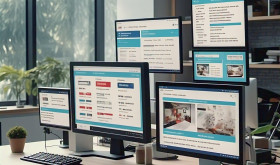
In today’s data-driven retail environment, using analytics has become essential for optimising operations and improving business decision making across different business sectors, including retail.
One fundamental feature in the modern-day Order Management System is strong analytics that caters to both sales performance metrics and operational efficiencies of a company. By making use of analytics, retailers have been able to develop valuable insights that drive efficiency, strengthen customer satisfaction, and eventually improve profitability.
Understanding Analytics in Order Management System
Analytics generally refers to the collection and analysis of data to understand trends over time-whether those trends relate directly to sales figures achieved through different channels, eCommerce versus brick-and-mortar, or operational efficiencies gained via streamlined workflows implemented throughout supply chain networks managed by integrated software solutions like those offered by the modern Order Management System.
Types of Analytics in Order Management Systems
Descriptive Analytics: This type focuses on summarizing historical data to understand what has happened in the past. Retailers can analyse sales data over specific periods to identify peak sales seasons or popular products.
Predictive Analytics: Using historical data and statistical algorithms, predictive analytics forecast future outcomes. For example, it may predict demand for certain products based on seasonal trends or marketing campaigns, thus helping retailers to prepare the inventory in advance.
Prescriptive Analytics: This advanced form of analytics provides recommendations for actions based on data analysis. It may suggest the optimal level of inventory or the best way to fulfil it to minimise cost while maximizing customer satisfaction.
Diagnostic Analytics: In this type, the past performance is analysed to understand why certain things happened. Through diagnostic analytics, retailers can investigate reasons for drops in sales or delays in fulfilment and thereby take steps to proactively solve those issues.
Why Analytics Matter
- Data-driven decision-making
In a time when intuition alone is not enough, having access to reliable insights gleaned from broad-based data enables decision-makers of every type-from the executive level all the way to front line-to make informed, evidence-based decisions and choices. Equipped with this critical resource, businesses can adapt at an instant to shifts in markets or consumer preference.
- Identification of Sales Trend and Opportunities
Powerful analytical tools integrated into your Order Management System enable tracking performance metrics across all channels, allowing for the identification of emerging patterns indicating potential areas for growth opportunities worth pursuing further. For example, if analytics reveal that a particular product is gaining traction among a specific demographic, retailers can tailor marketing efforts to capitalise on this trend.
- Optimising Inventory Levels
This will ensure that companies maintain optimal stock levels throughout the supply chains by carefully analysing historical sales data combined with current demand forecasts. It reduces both overstocking, which leads to excess carrying costs, and understocking, which results in lost revenue opportunities due to unfulfilled orders. Analytics can help retailers balance supply and demand correctly.
- Improvement of Customer Experience
Purchasing habits analysed across demographics give insight into the preferred choices within an organization’s target audience and are thus able to make available offerings that match these choices in pursuit of higher satisfaction levels among the client base. As such, customised purchase recommendations based on previous purchasing choices also enhance the experience and keep customers loyal.
- Efficiency in Operations
By applying sophisticated reporting tools available in most of the modern-day Order Management System, companies are able to recognise bottlenecks and inefficiencies taking place across workflows. This proactive stance allows them to institute corrective measures before things start to get out of hand and prevent disruptions that may dent profitability margins over time.
Implementing Effective Analytics Strategies
To harness the full potential of analytics built into your OMS of choice, do the following:
Choose Comprehensive Reporting Tools
Choose the Order Management System that has strong reporting capabilities to report in great detail on everything from sales performance metrics to operational efficiencies derived through streamlined workflows that will be implemented over time. With a complete toolset, deeper insights and decisions can be made more effectively.
Training of Staff on Data Interpretation
Also, ensure that employees understand how to interpret results generated through analytic reports in order to use the findings appropriately in making strategic decisions that affect future growth. This may involve periodic training sessions on how the staff can learn about new best practices for data analysis and interpretation.
Regular Review of Performance Metrics
Institute regular review processes where major stakeholders are brought together to review the progress made from predetermined benchmarks. This practice allows for adjustments to be made, when necessary, thus ensuring that continued alignment with objectives pursued in the overall business strategy is maintained.
Drive a Data-Driven Culture
Encourage a culture of data-driven decision-making throughout the organization. When employees understand the importance of analytics and feel empowered to use data in their roles, it fosters innovation and continuous improvement within the company.
Case Studies Highlighting the Impact of Analytics in Order Management Systems
Case Study 1: A Leading E-Commerce Retailer
A leading e-commerce retailer deployed an advanced Order Management System with integrated predictive analytics. By analysing historical sales data in conjunction with market trends, they were able to predict demand for their best-selling products during peak seasons. This foresight enabled them to optimise the levels of inventory across their warehouses, reducing stockouts by 30% and improving customer satisfaction ratings significantly due to timely deliveries.
CaseStudy 2: A Brick-and-Mortar Chain
One of the popular brick-and-mortar retail chains adopted an Order Management System that came loaded with rich diagnostic analytics features. Through historical measures on order fulfilment times and customer complaints, they discovered certain pain points in the supply chain process where there was considerable slowness in the order processing cycle. Through these areas, inefficiencies were tackled through pointed enhancements: improved staff training and inventory management. By so doing, it achieved a reduction in time spent for order processing by 25% and attained an improvement in customer loyalty, too.
Conclusion
Analytics is the linchpin for order management systems today as companies need to navigate an increasingly complex landscape driven by constantly evolving consumer behaviours and expectations. Thus, an investment of time and resources into leveraging such insights would indeed provide firms with a competitive edge and assist in the delivery of excellent service experiences.
Integrating robust analytics into your Order Management System will not only drive better operational efficiency but will also steer business decisions in line with the strategic objectives of a business. In this scenario of ever-evolving consumer expectations and unpredictably evolving market dynamics, businesses leaning toward analytics are more efficient at quickly changing their strategies for survival and thus competing in modern retailing.
Ultimately, adopting an end-to-end approach to analytics in the order management system is not about process optimisation alone; rather, it’s building a continuous improvement culture that furthers customer satisfaction and maximises profitability margins over the long term. In this age of information, only those who use analytics to their advantage will emerge as winners and become leaders in their own fields of operation.










